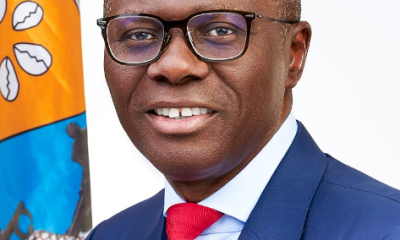Business
Is High Inflation a Big Concern For Equity Investors?
Published
2 years agoon
By
Olu Emmanuel
As Nigeria continues experiencing high inflation, and the Naira has been losing value, the economic state of the country becomes more unfavorable for many equity investors.
Inflation is a general increase in the cost of services and goods in the economy. Inflation decreases purchasing power. According to the National Bureau of Statistics (NBS), Nigeria’s Inflation increased to 18.60% in June.
To fight inflation, the CBN increased the interest rate to 14%. This should be a concern to equity investors who invest in heavily leveraged companies because hikes in interest rate, means higher interest payment on the debt these companies may have taken.
Critics accuse the government of dollarizing the economy ahead of the 2023 elections, & causing the Naira to lose value. However, the CBN has also taken measures to prevent abuse of the nation’s US dollar reserves. Godwin Emefiele, CBN’s governor has warned against buying dollars for elections and announced that anyone trying to buy dollars with Naira illegally, will be arrested.
All of these efforts are yet to yield fruits, as the Naira is still falling to the US dollar in the parallel market, elevating cost push inflation higher. There are implications for equity investors, especially those who hold stock of companies that cannot pass the increased cost of production down to customers, without seeing a drop in sales (defensive stock).
Companies will find it difficult to borrow
Borrowing money for the purpose of increasing profits or returns is called leveraging debt. Although borrowing for any reason is risky, here are some reasons why leveraging debt is important to a company:
- Optimization of supply chain: companies that experience seasonal variation in demand for their goods or services, can borrow money to optimize supply chains to increase efficiency, and reduce waste. With the money borrowed, they make more profit during the peak period of their demands to cover periods of smaller profits
- To pay suppliers in Advance: Borrowing enables companies to pay suppliers before collecting goods. This way the company can approach suppliers from a place of strength and could be at advantage to get discounts and more favorable transaction terms.
- For expansion: a company that is growing rapidly may need to borrow to build new plants and acquire machinery, in order to meet the increasing demands of their goods or services.
- Maintaining Equity in the company: A company founder who doesn’t want to share ownership of the company with equity investors may prefer to borrow than sell company shares.
During inflation, there is usually an increase in the cost of raw materials and labor. Due to this increase, companies may experience lower profit margin. Some companies may need to borrow to sustain the business.
Unfortunately, the aim of the CBN with increasing Interest rates, is to slow down the economy by discouraging both individual, and corporate borrowing.
Interest rate hikes to lower Inflation will make borrowing difficult for companies because they will now have to pay higher interest on the loan. Companies that may have borrowed with a floating interest rate, will be affected by new interest rate hikes.
Banks in Nigeria are already charging high rates for borrowing
As at 2020, Nigeria had an average lending bank rate of 13.64 but as inflation and interest rate continues to increase, the lending rates of banks is also increasing.
The Interest rates of the different commercial banks vary, depending on your credit worthiness. While the CBN’s current Interest rate is 14%, the CBN weekly interest rate report shows that some banks are already charging as high as 30% interest (max rate) for loans to individuals.
Before you borrow from banks, it is necessary to compare their interest rate with that of other banks. This is because for banks that demand higher interest, it will be more difficult for you to pay off the loan.
Financial experts in Nigeria warn against Nigerian companies taking dollar loans, because it will be more difficult for them to pay off. However many startup companies prefer to raise capital from venture capitalists overseas.
With the global Inflation caused by the war in Ukraine, China’s zero Covid’19 policies etc., other countries like the United States are also facing inflation.
The US Federal Reserve Bank has increased interest rate to a benchmark range of 2.25%-2.50% to fight inflation. This may not augur well for companies with dollar denominated loans, like access bank’s Eurobond worth US$500 million at a yield of 6.125% with maturity date in September 2026.
The Head of Research and Investment, FSL Securities Limited Mr. Victor Chiazor has warned that the increase in interest rate will affect companies with dollar denominated loans. This he said, is because they will make less profits while trying to pay off loans. He has added that those with floating Interest rate will experience continuous adjustments of interest, as central banks keep hiking interest rates.
Godwin Emefiele (CBN governor) has also warned Nigerian against Dollar denominated loans as they are more expensive to pay off. The apex bank has pledged to provide Naira denominated funds to entrepreneurs to encourage them to take naira funded loans that are cheaper to pay off.
Impact on financial markets & currencies
Moving on to the financial markets, the inflation could have a direct impact on the margins of companies as most of the companies may find it hard to pass on the price increase to customers.
But stock owners can hedge against potential downside as stockbrokers in Nigeria also cater to clients who want to benefit from falling stock prices & have to follow the rules. This practice is called short selling, and involves borrowing shares from a broker, selling them at their prevailing price then waiting for the price to fall before repurchasing for lower, and returning to broker.
These short sellers pay interest for as many nights as they keep the short position open, and are subject to margin calls if they default.
Retail online forex traders in Nigeria aren’t left out as they too speculate on global currency movements for profit. There are estimated to be around 200,000 forex traders in the country, which have grown in number during the pandemic, despite the lack of regulation.
The current macro environment has made the currency markets very volatile & interesting for currency traders. The US Dollar has appreciated a lot against the other currencies in Africa, EM & even developer countries.
All the major forex brokers in Nigeria offer leverage to traders which allows them to multiply profits made. However, leverage means taking a margin loan from the broker, and attracts interest payments for as long as an order is left open. So it can be seen that inflation-caused interest rate hikes affect many market participants from top to bottom.
An Increase in the cost of production
Manufacturers Association of Nigeria (MAN) contributes about 8.93% of the country’s GDP and is a body that represents about 3,000 manufacturers across the country. The current inflation in Nigeria has increased the cost of production for this sector and to worsen the burden, the CBN is hawkish.
In a press release signed by the Director General of MAN: Segun Ajayi-Kadir, the organization expressed its displeasure with the CBN’s increase of interest rate by 100 basis points from 13% to 14%. The association stated that this increase in interest rate will slow down the recovery of the manufacturing sector, and reduce their contribution to the country’s GDP.
Coupled with the challenges of inflation and increased interest rate, the sector is also concerned about NERC’s increase in electricity tariff. With this increase, manufacturers are slammed with huge electricity bills which is taking a toll on them. With all of these challenges, it is almost inevitable for the price of commodities not to increase.
To assist the manufacturing sector with the high cost of production, the CBN has come up with single digit Interest support for the sector like the governments N1.1 Trillion COVID-19 Stimulus for the private sector, but some manufacturers have said access to the funds is slow and cumbersome. The point here is that the manufacturers will pass down these excessive production costs to the consumers thus increasing inflation
Stocks will lose value
Within 8 days of the CBN,’s increase of interest rate to 14%, Nigeria’s stock exchange lost over N1 trillion. On the 19th of July, market capitalization of equities in Nigeria stock exchange stood at N28.208 trillion and 8 days later, it plugged to N27.162 trillion.
In the month of July 2022, the NSE 30 index and NSE all share index declined in performance, and this can also be attributed to CBNs fight against inflation which has caused it to hike interest rates.
Equity investors are now looking at fixed income assets like bonds for safety. Already FGN 2 & 3 year savings bonds are already being auctioned. Since the government has increased Interest rate, bonds are now regarded as a safer haven for equity investors, as it assures them of periodic dividends.
Financial take away
Equity investors should be concerned about the high inflation, interest rate hike and loss of value of Nigeria’s stock exchange, as they are all red flags. Borrowing puts you at more risk and with headwinds pointing towards a recession, you want to be careful what risk you are taking on.
Trending

 Health & Fitness1 week ago
Health & Fitness1 week agoAnother GMO ‘vanity product:’ Bayer to sell gene-edited salad greens in Stores

 Latest7 days ago
Latest7 days agoRivers State: Why is Fubara sleeping on the Investigative Panel?

 Crime2 days ago
Crime2 days agoSuspect who sold registered sim cards to criminal arrested

 Health & Fitness6 days ago
Health & Fitness6 days agoDangers in GMO foods go beyond genetic engineering alone, expert warns

 Crime3 days ago
Crime3 days agoPolice officer bags death sentence for killing phone repairer over N100 bribe

 Featured6 days ago
Featured6 days agoBREAKING: Sanwo-Olu emerges South West Govs’ forum chairman

 Featured4 days ago
Featured4 days agoAtiku sympathizes with Tinubu over misstep at Democracy Day parade at Eagles Square

 Latest4 days ago
Latest4 days agoPresidency reacts to Tinubu’s slip at Democracy Day parade




